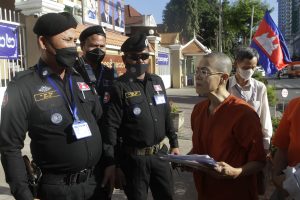The death of Alexei Navalny in Russia serves as a reminder of the constant risks faced by Cambodian political prisoners and dissidents who have survived assassination attempts and other physical attacks.
Navalny, the most prominent critic of the brutal dictatorship of Vladimir Putin, died in an Arctic prison where he was serving jail terms totaling 29 years. He was only 47 years of age, and his family and supporters are convinced that he was killed on Putin’s orders.
Navalny’s death shows the importance of a more coherent international position on political prisoners in dictatorial regimes. Waiting and hoping for the best serves no purpose.
Cambodia, according to Human Rights Watch, currently has more than 60 political prisoners. These include Kem Sokha, the leader of the opposition Cambodia National Rescue Party when it was dissolved in 2017 by the country’s politically controlled Supreme Court.
Kem Sokha was last year sentenced to 27 years in prison on a bogus charge of treason for which no clear evidence was ever produced. He is currently confined to his house, and denied access to anyone except immediate family members. He can’t even see his own defense lawyers or get medical treatment without official permission.
Another high-profile prisoner is Theary Seng, a lawyer and human rights activist who has U.S. as well as Cambodian citizenship. She has several times been on hunger strike since she was imprisoned after a mass trial of regime critics in June 2022. The regime remains responsible for her safety, and that of all its other political prisoners.
Vladimir Putin, like former Prime Minister Hun Sen and his son and successor Hun Manet, is content to rule by fear rather than to risk public accountability at the ballot box. But the Hun dictatorship in Cambodia is much weaker than the Putin regime in Russia. After failing to assassinate me on several occasions, starting with a deadly grenade attack in 1997, Hun Sen preferred to keep me in forced exile outside of the country rather than risk allowing me to face trial in Cambodia on any of the long list of politically fabricated charges which his regime concocted. He preferred to get me sentenced in absentia to a total of nearly a hundred years in prison in addition to a separate life sentence.
In 2019, when I last tried to return home, Hun Sen forbade any airline from bringing me to Cambodia. He even asked Thailand to prevent me from landing in Bangkok to avoid the possibility of my entering Cambodia by land. Any such event would have created the kind of focal point for the opposition which Hun Sen was desperate to avoid.
Allowing the Hun regime to continue to hold these political prisoners, who are more accurately seen as hostages, creates the risk that one day the government will be tempted to simply start eliminating them. The regime has demonstrated the close link that exists between international legitimacy being granted to a dictatorial regime, and the confidence of that regime in doubling down on its repression.
Hun Manet, who took over the position of prime minister from his father in August 2023, was received by French President Emmanuel Macron in January. That emboldened the regime to arrest two more opposition supporters, Ma Chinda and Hak Kosal, at the end of January.
The pattern repeated itself in February when Hun Manet visited Thailand. The Thai preparations for the visit included a spate of arrests of exiled Cambodian opposition supporters. Hun Manet publicly thanked Thai Prime Minister Srettha Thavisin for not allowing the arrested people to “interfere” with Cambodia’s
internal affairs. Those arrested were Cambodians who had fled their home country in fear of their own government.
The pattern will continue for as long as the outside world allows it to. The current policy of democratic countries on Cambodia fluctuates uneasily between pro forma condemnations of specific abuses, and continuing to deal with the regime as a good-faith partner, while hoping, in the face of decades of evidence to the contrary, that everything will somehow turn out for the best.
This is simply taking the path of least resistance. A more proactive stance is long overdue. Individual sanctions on those responsible for human rights abuses in Cambodia should be imposed now, rather than waiting to see if the regime is willing to kill its political prisoners. Such sanctions would create a bargaining tool for democratic countries to use, and the possibility of offering a positive incentive for the regime to at least follow minimal international standards on human rights.
Democratic countries can maximize the impact of these individual sanctions by coordinating their implementation. Full trading relationships with free countries need to be made conditional on the release of all political prisoners, and holding free and fair elections in which all parties are allowed to compete without intimidation.

































